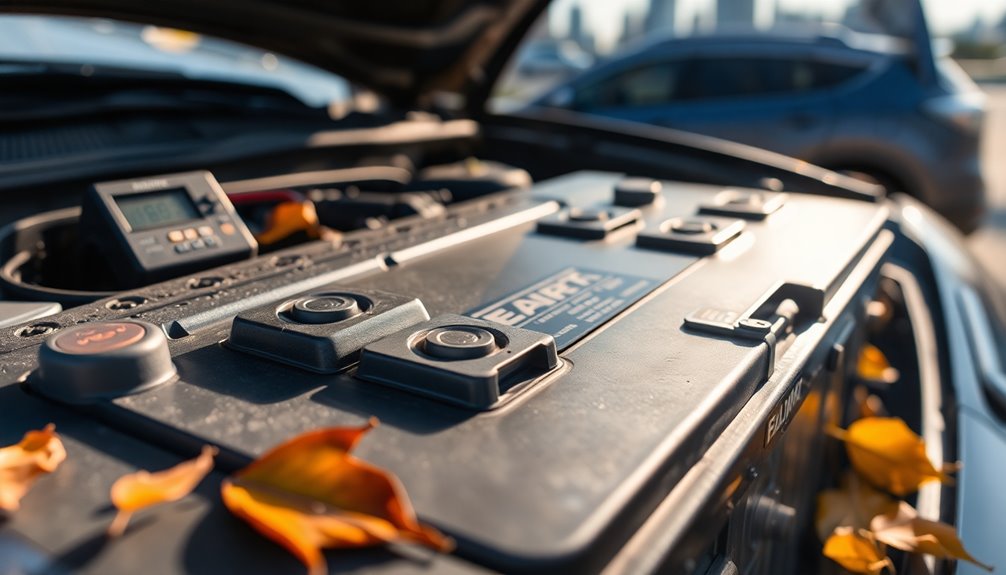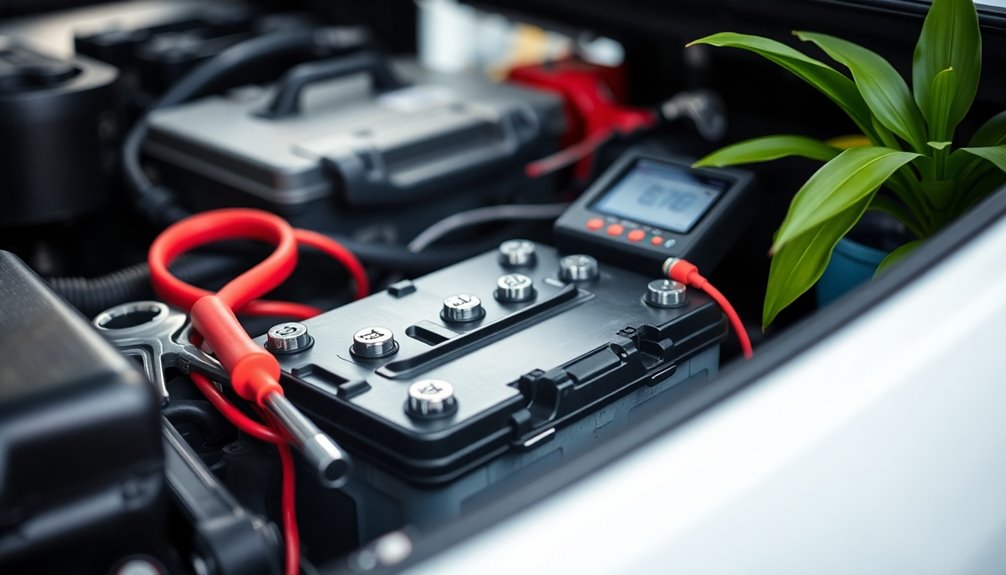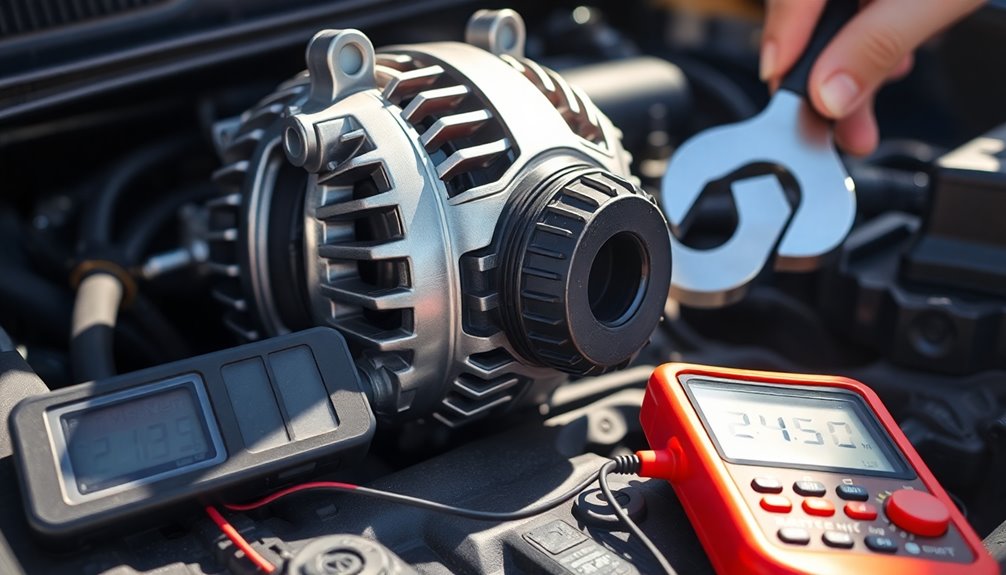Car batteries usually last about 3 to 4 years, but this can vary. Only about 30% reach a full 48 months. Factors like driving habits, climate, and maintenance play vital roles. For instance, hot climates typically shorten a battery's lifespan to around 30 months, while cold weather can extend it slightly to about 51 months. Frequent short trips can drain your battery quicker, while longer drives help maintain charge. Regular checks can alert you to signs of failure, allowing you to act before it's too late. There's more you should know to keep your battery in top shape!
Key Takeaways
- The average lifespan of car batteries is 3 to 4 years, with only 30% lasting a full 48 months.
- Hot climates can reduce battery life to around 30 months, while cold climates can extend it to 51 months.
- Frequent short trips limit battery charging, leading to quicker drain and potential failure.
- Regular maintenance, like terminal cleaning and inspections, can significantly extend battery life beyond the average.
- Signs of a failing battery include slow engine cranking, dim lights, and dashboard warning indicators.
Lifespan of Car Batteries

When it comes to the lifespan of car batteries, you'll find that the average range is typically between 3 to 4 years.
However, only about 30% of car batteries last a full 48 months, often depending on factors like the climate where you live. In cold climates, batteries can average 51 months, while those in hot areas may only last around 30 months due to faster wear.
Additionally, modern vehicle electronics can drain your battery more quickly, impacting how long they last.
Regular maintenance, like keeping your battery fully charged, can greatly extend its life. Avoid prolonged low charge or deep cycling to guarantee your battery performs well for as long as possible.
Factors Affecting Battery Life

Several factors can greatly impact your car battery's lifespan, so it's vital to understand them. Your driving habits play a significant role; frequent short trips prevent the battery from fully charging. Additionally, climate conditions can affect battery life, with hot environments causing corrosion and shorter lifespans. Routine maintenance is essential; neglecting to clean terminals or check electrolyte levels can lead to premature failure.
| Factor | Impact on Battery Life |
|---|---|
| Driving Habits | Short trips decrease charging time |
| Climate Conditions | Hot areas shorten lifespan |
| Routine Maintenance | Regular checks extend battery life |
| Electrical Use | Excessive use drains battery quickly |
Driving Habits and Battery Health

Your driving habits play an essential role in your car battery's health.
Frequent driving helps keep your battery charged, while short trips can leave it undercharged and lead to faster drain.
To maximize battery life, aim for longer drives and be mindful of how often you use your vehicle.
Frequent Driving Benefits
Frequent driving greatly benefits your car battery's health, as regular use allows the alternator to recharge the battery effectively.
Longer trips help maintain the charge, preventing insufficient charging that can occur with short drives. To keep your car battery active and well-charged, aim for a 30-40 minute drive at least once a week.
This consistent driving habit not only keeps your battery healthy but also reduces the risk of early replacements. If you leave your car unused for weeks, it can lead to significant battery discharge and a shorter lifespan.
Short Trips Impact Battery
While regular driving helps maintain your car battery's health, short trips can have the opposite effect.
When you only make quick drives, your battery often doesn't get a chance to fully recharge. This limits the alternator's ability to keep the battery topped off, leading to a gradual decline in performance.
Plus, modern vehicles with many electronic accessories can drain the battery even faster during these short trips. If you don't drive your car for 6 weeks to 6 months, you might end up with a completely dead battery.
To keep the battery healthy, aim for a 30-40 minute drive each week. This routine can greatly extend the lifespan of your new battery.
Climate Impacts on Batteries

Understanding how climate affects car batteries is vital for maximizing their lifespan.
In hotter climates, high temperatures accelerate corrosion and evaporation, reducing your battery's charge capacity and leading to a dead battery sooner than you'd expect. On average, car batteries last around 30 months in these conditions, compared to 51 months in colder climates.
However, cold weather isn't without its challenges; it can reduce a battery's strength by up to 35%, making it harder for you to start your vehicle.
Extreme temperature fluctuations put additional strain on batteries, increasing the risk of premature failure.
Regularly monitoring battery health is essential, regardless of the climate, to guarantee peak performance and longevity.
Signs of a Failing Battery

A car battery can show several warning signs when it's beginning to fail. You might notice that your engine takes longer to crank, often more than a few seconds, indicating a low battery charge.
Dimming interior lights, especially during startup, can also signal reduced battery power. Keep an eye on your dashboard—if a warning light pops up, it's time to pay attention.
Visible damage, like cracks or corrosion around the terminals, suggests your battery may need replacement soon.
Finally, if you smell a pungent sulfur odor near the battery, it could mean a leak or internal failure, requiring immediate action.
If you experience any of these signs, head to your service center for a thorough check.
Importance of Regular Maintenance

Noticing signs of a failing battery is just the first step in ensuring your vehicle runs smoothly. Regular maintenance is key to keeping your batteries in top shape and can extend their life beyond the typical 3 to 4 years. Checking for corrosion and ensuring proper electrolyte levels are essential tasks that prevent premature failure. It's wise to schedule a battery inspection after three years of use to catch potential issues early before you need a new one. Here's a quick guide to help you remember crucial maintenance tasks:
| Maintenance Task | Frequency |
|---|---|
| Inspect battery terminals | Monthly |
| Clean corrosion | Every 6 months |
| Check electrolyte levels | Every 3 months |
| Replace batteries | As needed |
| Professional inspection | Annually |
Battery Replacement Services

When it's time for a battery replacement, knowing where to go can make all the difference. Automotive repair shops and dealerships like Ira Toyota of Danvers offer reliable battery replacement services with skilled technicians ready to assist you.
Typically, you'll need a new car battery every 3 to 4 years, so it's smart to stay proactive. Regular inspections after the 3-year mark can help catch any issues before they lead to a breakdown.
Many service centers enhance your experience by offering amenities like courtesy shuttles, free Wi-Fi, and complimentary car washes while your vehicle is serviced.
If you have questions about battery lifespan or replacement services, reaching out through contact forms guarantees quick communication with the experts.
Frequently Asked Questions
What Is the Normal Life Expectancy of a Car Battery?
You might think your car battery's invincible, but it's really got a ticking clock!
Typically, you can expect a car battery to last around 3 to 5 years.
However, don't be surprised if it gives up on you sooner, especially if you live in extreme weather or make a lot of short trips.
Regularly checking your battery can be a game changer, helping you avoid unexpected breakdowns and keeping your ride smooth!
Is a 7 Year Old Car Battery Still Good?
A 7-year-old car battery isn't likely to be good anymore. By this age, it's well past its typical lifespan, and the chances of failure are high.
You should definitely have it tested for charge capacity and overall health. Look for visible signs like corrosion or cracks, too.
If you notice any issues, it's wise to replace it to avoid being stranded when you least expect it.
Is There a Warning Before Your Car Battery Dies?
Before your car battery dies, it often gives you subtle hints, like the faint echoes of a distant thunderstorm.
You might notice longer cranking times when starting your engine, or dimmer interior lights that seem to flicker with uncertainty.
Dashboard warning lights may flash, urging you to pay attention.
If you smell sulfur or see cracks on the battery casing, don't ignore these signs—they're your battery's way of asking for help.
How to Know if a Car Battery Needs to Be Replaced?
To know if your car battery needs replacing, watch for a few key signs.
If your engine cranks slowly or takes longer than a few seconds to start, that's a red flag. Dimming lights or warning signals on your dashboard also indicate trouble.
Inspect the battery for cracks or corrosion, and if you smell sulfur, act fast. Regular checks after three years can help you catch issues before they escalate.
Conclusion
In the end, knowing how long car batteries last can save you from unexpected surprises. By understanding the factors that impact their lifespan, you can drive confidently, no matter the climate. Regular maintenance is your best friend, helping you catch signs of a failing battery before you're left in the dark. So, take charge of your car's health today—after all, a well-cared-for battery is a happy battery, and a happy battery keeps you moving forward!










